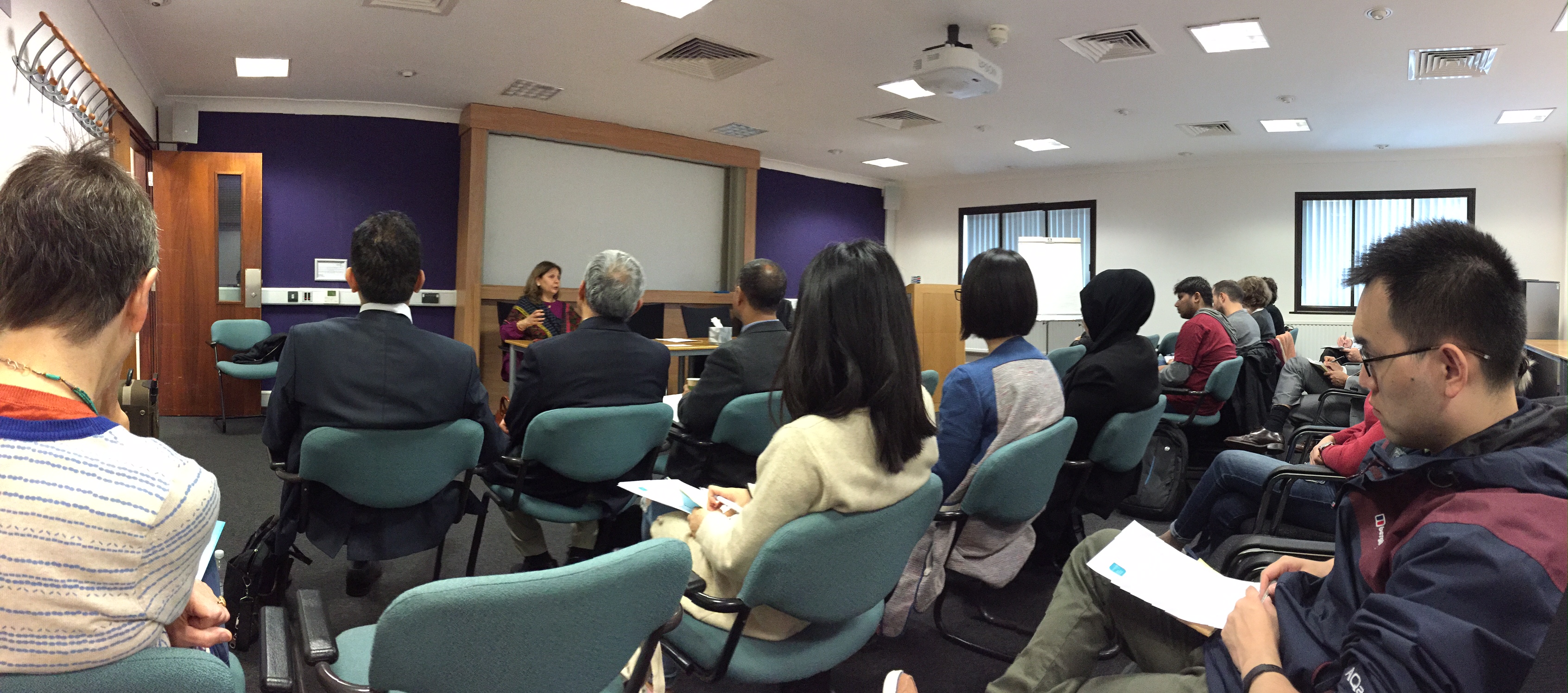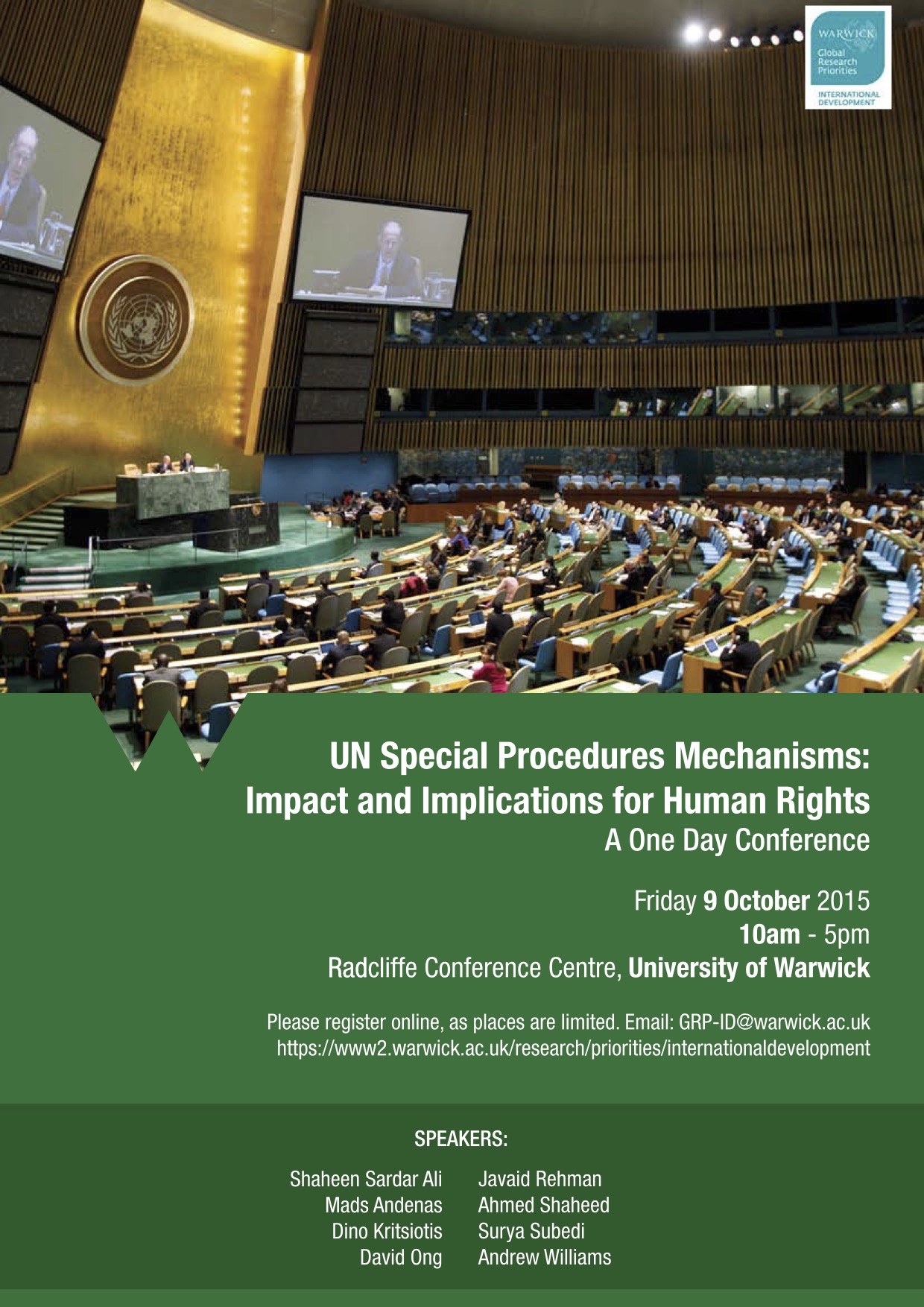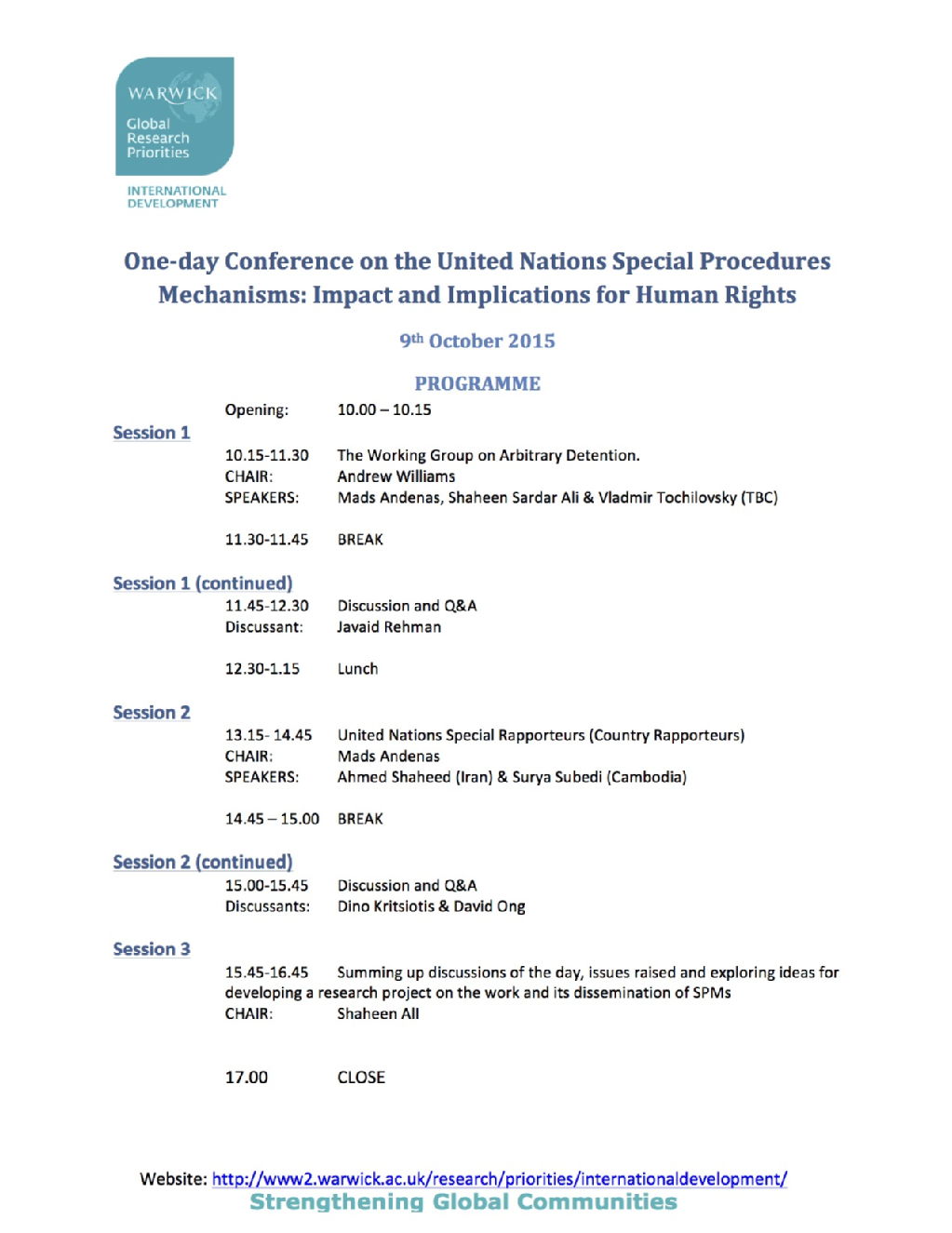UN Special Procedures Mechanisms: Impact and Implications for Human Rights
Thank you to all speakers and delegates of this thought provoking and in-depth consideration of the UN Special Procedures Mechanisms. This conference was over-subscribed, and the issues arising will continue to be discussed.

Report of the One-day Conference on the United Nations Special Procedures Mechanisms: Impact and Implications for Human Rights - 9th October 2015 at Warwick University
One of the ways in which the United Nations protects and promotes human rights and development is through its Special Procedures Mechanisms (SPM) comprising Working Groups and Special Rapporteurs. These Working Groups and Special Rapporteurs are focused on particular themes of human rights including the Working Group on Arbitrary Detention, Working Group on Involuntary and Enforced Disappearances; Working Group on Discrimination Against Women in Law and Practice. Thematic Special Rapporteurs include Special Rapporteur on the Right to Education, Special Rapporteurs on the Right to Food; Special Rapporteur on Cambodia, Special Rapporteurs on Iran, to name a few. Compared to Treaty-bodies of the UN, work of the SPMs is not as well-known and understood despite its wide reach and normally dependent upon States’ accession to human rights treaties. More importantly and critical to future developments in this area of human rights protection and promotion is the absence of indicators or means of assessing the impact of Special Procedures on the lives and situation of vulnerable people.
Having recently completed a six-year tenure as member and Vice-Chair of the UN Working Group on Arbitrary Detention, Shaheen Sardar Ali, Warwick Law School, with the support of the Global Research Priorities Programme – International Development organised a one-day conference to bring together UN Special Rapporteurs to share experiences and impact of these roles. More specifically, the conference looked at ways in which to take forward preliminary discussions among the participants to explore possibilities of developing a research project on SPMs of the United Nations.
The aim of the one-day event was:
- To bring together Special Rapporteurs and members of UN Working Groups to Warwick on one platform;
- To share experiences of SPMs with a broader academic and activist audience and the role they play in promotion and protection of human rights and development
- To highlight their role in standard-setting and development of international human rights
- To reflect on challenges, shortcomings and ways in which to make the system more robust in responding to human rights violations.
The three Special Rapporteurs who shared their experiences were Shaheen Sardar Ali (former member and Vice-chair of the United Nations Working Group on Arbitrary Detention); Surya Subedi, former UN Special Rapporteur on Cambodia, and Ahmed Shaheed, UN Special Rapporteur on the Islamic Republic of Iran. All three speakers contextualized their roles within the working methods set out by their respective group/mandate followed by personal narratives highlighting how Special Rapporteurs navigate difficult and sometimes hazardous situations on the ground. Javaid Rehman, David Ong and Dino Kritsiotis offered responses to the three presentations and raised a number of interesting questions and points for further discussion and research.
1. The most striking feature of the work of Special Rapporteurs reflected in the presentations was the rich, varied and complex roles played by them in the protection and promotion of human rights. These ought to be shared and disseminated more widely;
2. The important and often invisible role of the work of SPMs in the development of international law and human rights. Deliberation No. 9 of the UN Working Group on Arbitrary Detention, and Principles and Guidelines on Remedies and Procedures on the Right of Anyone Deprived of His or Her Liberty by Arrest or Detention to Bring Proceedings Before Court, were cited as examples;
3. The interaction of States and Governments and UNSPMs in negotiating human rights situations as well as developments such as those mentioned in (2) above, led to a very interesting discussion. In particular, the international lawyers at the conference raised questions regarding positions adopted by the SPMs, whether these were supported by existing state practice and how these potential/possible changes to international law and human rights may be measured and assessed;
4. Speakers and Participants agreed that it was important to develop indicators to assess the impact of SPMs and that research projects to this effect were timely and required;
5. It was agreed that in order to develop the ideas and research questions further, funding bodies be approached for (i) a seminar series to bring other Special Rapporteurs to broaden the knowledge base on the subject and (ii) in parallel with the seminar series develop a research project for submission to funding bodies.
The aim of this event are:
- To bring together Special Rapporteurs and members of UN Working Groups to Warwick on one platform;
- To share experiences of SPMs with a broader academic and activist audience and the role they play in promotion and protection of human rights and development
- To highlight their role in standard-setting and development of international human rights
- To reflect on challenges, shortcomings and ways in which to make the system more robust in responding to human rights violations.
This form is closed and is no longer accepting any submissions.
Thank you for your time.

One of the ways in which the United Nations protects and promotes human rights and development is through its Special Procedures Mechanisms (SPM) comprising Working Groups and Special Rapporteurs. These Working Groups and Special Rapporteurs are focused on particular themes of human rights including the Working Group on Arbitrary Detention, Working Group on Involuntary and Enforced Disappearances; Working Group on Discrimination Against Women in Law and Practice. Thematic Special Rapporteurs include Special Rapporteur on the Right to Education, Special Rapporteurs on the Right to Food; Special Rapporteur on Cambodia, Special Rapporteurs on Iran, to name a few. Compared to Treaty-bodies of the UN, work of the SPMs is not as well-known and understood despite its wide reach and normally dependent upon States’ accession to human rights treaties. More importantly and critical to future developments in this area of human rights protection and promotion is the absence of indicators or means of assessing the impact of Special Procedures on the lives and situation of vulnerable people.
Having recently completed a six-year tenure as member and Vice-Chair of the UN Working Group on Arbitrary Detention, Shaheen Sardar Ali, Warwick Law School, with the support of the Global Research Priorities Programme – International Development has organised a one-day conference to bring together colleagues in SPM to share our experiences of these roles. More specifically, the aim of the conference, is to take forward preliminary discussions among the participants to explore possibilities of developing a research project on SPMs of the United Nations.

